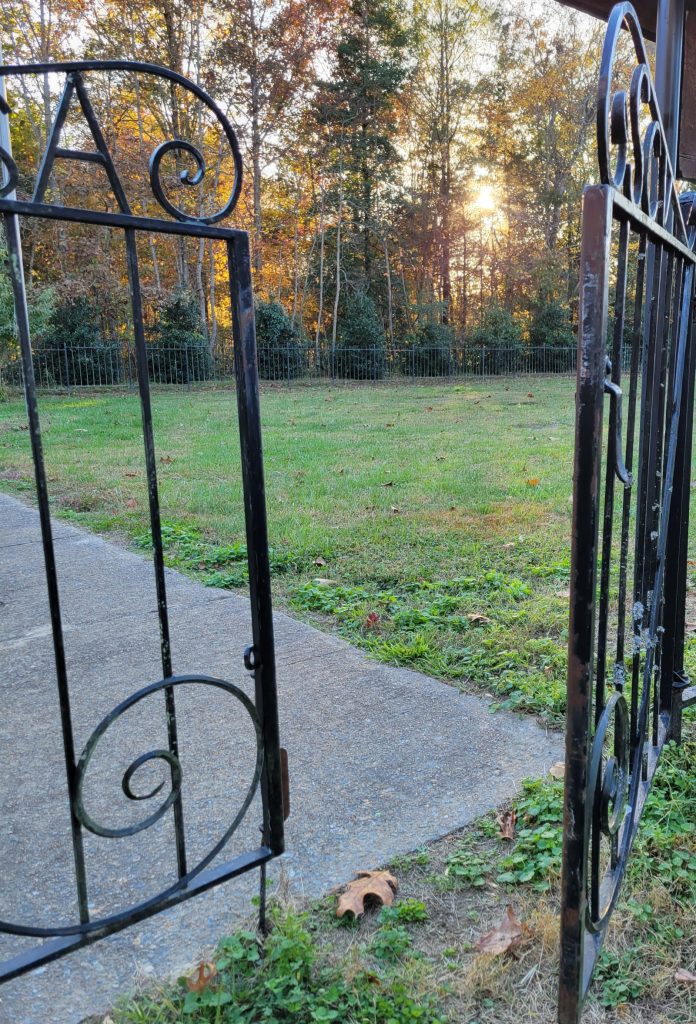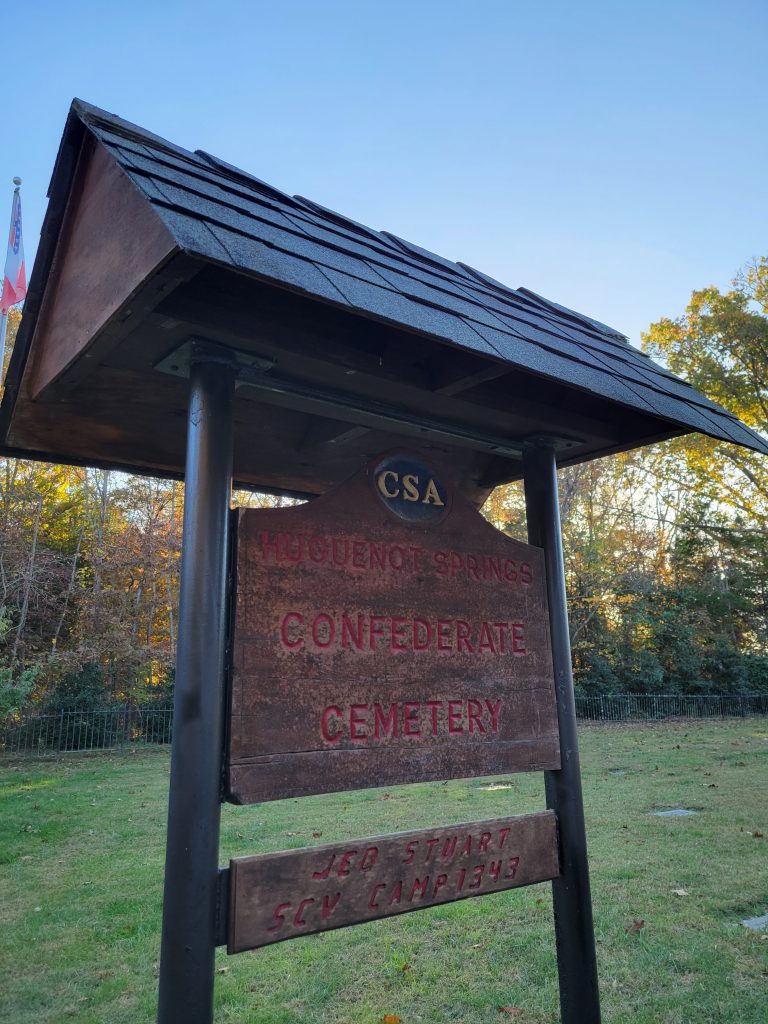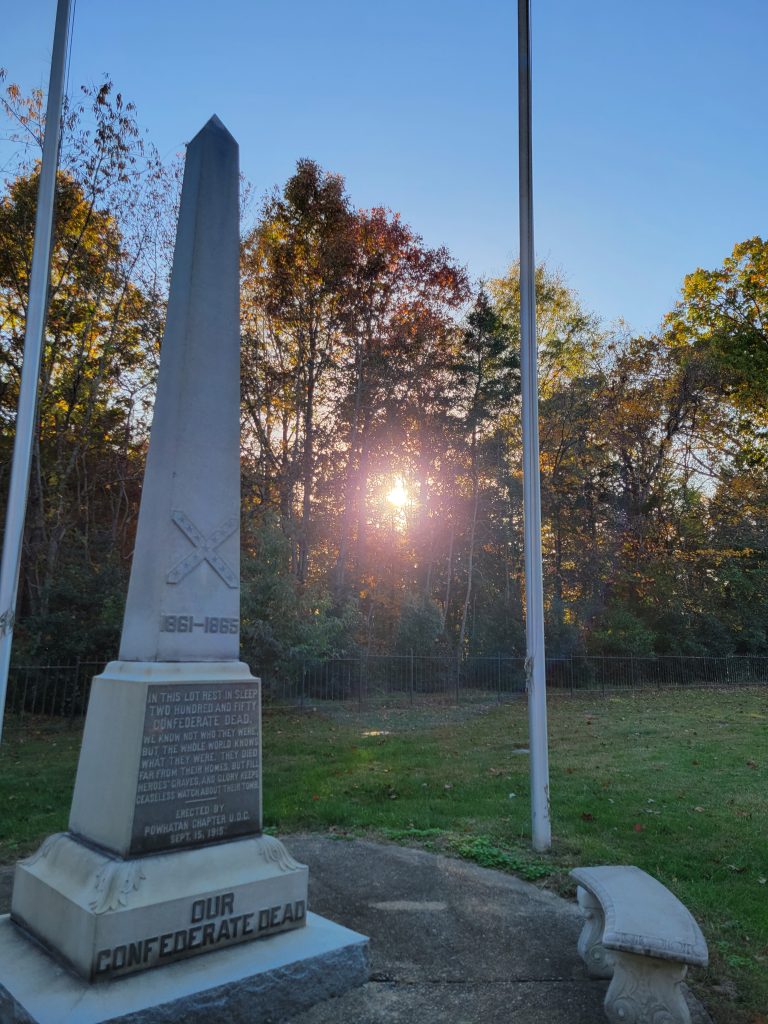ECW Weekender: Huguenot Springs Confederate Cemetery
Approximately 18 miles west of the Virginia State Capitol building, Huguenot Springs Confederate Cemetery is tucked along a small lane and in the shadows of history. Last autumn I went searching for the location and found it without too much trouble. Flat gravestones spell the names of soldiers known to be interred at the cemetery, and a tall memorial monument added by the United Daughters of the Confederacy in 1915 stands at the center of the burial ground. A local Sons of Confederate Veterans group has made improvements and carried out cemetery maintenance in the recent years, including the addition of the flat grave markers in 2021.
So why this cemetery and why here? This burial ground was once adjacent to a Confederate hospital located in this vicinity — about 500 yards to the left of the cemetery, according to the Civil War Trails sign. Approximately 250 soldiers who died at the hospital were buried here; 92 soldiers have been identified and markers are inscribed with their names.
The location took its name from the early 18th Century when French Protestants (Huguenots) settled in the area on land that William Byrd granted to them. Coal mining brought more settlers to the area, but as the mining ventures eventually moved further west a new business venture started. Huguenot Springs Hotel opened in 1847 as a spa and resort. The three-story hotel and collection of 12 cottages adjacent to natural springs attracted Richmond city-dwellers looking for health cures or somewhere to spend the summertime away from the city.
In 1862 Confederate surgeons took over the hotel and its “healthful location” to establish a hospital for sick or convalescent soldiers. Patients were generally moved by railroad from the larger hospitals in Richmond to Robious Station and then transported by wagon-ambulance to the improvised medical facility. It is probable that most of Huguenot Springs Hospital’s records were sent to the Confederate Medical Department in Richmond and likely lost during the fires in 1865. However, a few newspaper references surfaced.
In the July 23, 1862, edition of the Richmond Dispatch, Horace H. Dyson of the 18th Virginia Infantry Regiment published a letter to the editors, taking the paper and his regimental officers to task for listing him as a deserter the previous month. He explained that he had become ill with “bloody dysentery” and been unable to fulfill his duties. On July 6, he had gone to Richmond, reported to a surgeon at Chimborazo Hospital, and stayed there for several days. “I was then sent from there, in company with eighty others, to the Huguenot Springs hospital. After being there a short time, I got a transfer to my home, believing, as the surgeon did at the Springs hospital, that I would improve faster at home than in the hospital, and thereby be able to sooner to return to my place in my company.” Dyson further provided and published documentation for his story, including a note from a surgeon at Huguenot Springs hospital, dated July 15, 1862: “Private H. H. Dyson, of company C. 18th Va regiment, has permission to visit his home, in the county of Nottoway, Virginia, and report at this hospital at the expiration of ten days, or be considered a deserter. Wm. T. Walker, Surg’n. A.S. Epes, Ass’t Surg’n.[i]
The following year Chaplain George W. Hyde penned a letter from Huguenot Springs Hospital on April 20, 1863, which was published in the South Western Baptist. His main points of information and plea centered on the need for religious reading materials which the convalescing soldiers enjoyed reading. He explained: “There are between four and five hundred sick soldiers here, and among them quite a number of Alabamians.”[ii]
After the Civil War, Huguenot Springs reopened as a hotel, but the main structure burned in 1890. Several of the original cottages survive, though, and part of the property is now an event center – “a retreat and a gathering place for family, friends and the community, and a place to create, showcase, and enjoy food and art.”
 In the popular view of Civil War medicine, convalescent hospitals like this one at Huguenot Springs can be easy to overlook. Sickness is often viewed as less dramatic or sacrificial than wounds or field hospital experiences. However, having an identified cemetery location that was connected to a hospital creates a visible reminder of that death in the Civil War did not just occur on battlefields or from bloody injuries. For at least 250 Confederate soldiers, death took them at the Huguenot Springs hospital and their remains stayed here, somewhat marked but still not returned to their families at home.
In the popular view of Civil War medicine, convalescent hospitals like this one at Huguenot Springs can be easy to overlook. Sickness is often viewed as less dramatic or sacrificial than wounds or field hospital experiences. However, having an identified cemetery location that was connected to a hospital creates a visible reminder of that death in the Civil War did not just occur on battlefields or from bloody injuries. For at least 250 Confederate soldiers, death took them at the Huguenot Springs hospital and their remains stayed here, somewhat marked but still not returned to their families at home.
 The hour approached sunset when I visited Huguenot Springs Confederate Cemetery. I thought about the soldiers who had been at the nearby hospital who did recover and survive, but here lay ones who did not. The metal gate screeched eerily as I let myself in and out of the cemetery. The sunlight filtered just right and I paused to take a photo at the gate, thinking of the very thin threshold between life and death, mortal and immortal, present and eternity. Later, I found a poem written by a soldier at Huguenot Springs Hospital in July 1862, contemplating similar themes and his desire to see loved ones on earth one more time.
The hour approached sunset when I visited Huguenot Springs Confederate Cemetery. I thought about the soldiers who had been at the nearby hospital who did recover and survive, but here lay ones who did not. The metal gate screeched eerily as I let myself in and out of the cemetery. The sunlight filtered just right and I paused to take a photo at the gate, thinking of the very thin threshold between life and death, mortal and immortal, present and eternity. Later, I found a poem written by a soldier at Huguenot Springs Hospital in July 1862, contemplating similar themes and his desire to see loved ones on earth one more time.
Thoughts of Home
O could I say “I’m home tonight”
What rapture it would bring
Upon my young and ardent heart,
Where pure affections spring.
I’d clasp my age[d] father’s hand
Upon my throbbing breast;
For soon I know he leave this vale
For an eternal rest.
My mother’s form I would caress
In earnestness and love,
And think of all the joyous songs
She taught me by the grove.
My sister, too, with whom I’ve played,
And fondly cherished here;
I’d soothe the sorrows of her heart
And check a silent tear.
I’d greet my mother’s noble form
Upon this earth once more;
But, ah! Perhaps we ne’er shall meet
Till on yonder distant shore.
But soon, I trust, if life be spared,
I’d meet with those at home,
Beside the winding healthful stream,
Where I have loved to roam.[iii]
To visit Huguenot Springs Confederate Cemetery, use this address in a GPS. There is also a Civil War Trails sign at the location.
915 Old Confederate Cemetery Rd, Midlothian, VA 23113
Sources:
Encyclopedia of Virginia: https://encyclopediavirginia.org/geodata/huguenot-springs-confederate-cemetery/
FindAGrave: https://www.findagrave.com/cemetery/50716/huguenot-springs-confederate-cemetery
Huguenot Springs (event center): https://www.huguenotsprings.com/
Powhatan Historical Society: http://www.powhatanhistoricalsociety.org/cemetery/csa-cem.html
[i] Richmond Dispatch, July 23, 1862, Page 2. Accessed through Newspapers.com
[ii] South Western Baptist (Alabama), April 30, 1863, Page 2. Accessed through Newspapers.com
[iii] Jacksonville Republican (Alabama), August 28, 1862, Page 2. Author unknown. Accessed though Newspapers.com




I have a distant relative that was in the hospital and died at Dill Springs, also somewhere around Richmond. I’m guessing that Dill Springs and Huguenot Springs were similar in nature, but I have been unable to determine where Dill Springs was located and if anything still remains. Any idea on where I should look to get clues or answers?
Wonderful article, Sarah.
For those who may be interested, here is a link to the cemetery site on “Find-A-Grave”. There are 110 memorials with names/dates.
https://www.findagrave.com/cemetery/50716/huguenot-springs-confederate-cemetery
Wonderful post, Sarah.
For those who may be interested here is a link to the cemetery on the Find-A-Grave web site. There are 110 memorials with names/dates.
https://www.findagrave.com/cemetery/50716/huguenot-springs-confederate-cemetery
Beautifully written and poignant as usual, Sarah.